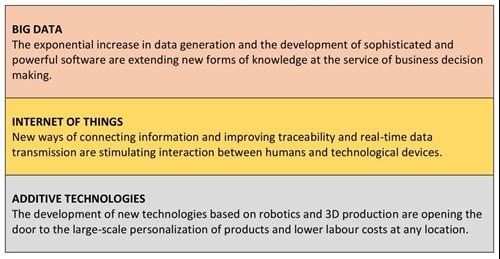- Strategy
Preparing for Industry 4.0
7 key recommendations on implementing an Industry 4.0 strategy
Over the last few decades, industrial growth has declined throughout the Western world, in part due to a severe decapitalization process and the relocation of production to low-cost countries. In this challenging scenario, there is growing awareness of the need to reindustrialize the West.
“The complexity of the environment and the opportunities offered by globalization demand the development of new attributes on which to build the industrial future,” says ESADE Associate Professor Carles Roig.
What attributes should this new industry have? According to findings published in Harvard Deusto Business Review, businesses that want to thrive in this environment should develop a series of new attributes that target:
- Speed and flexibility of response
- New formulas for collaboration and relations
- Greater and better use of databases and sources of information
- Implementation and good use of new manufacturing technologies
Industry 4.0 goals
The term Industry 4.0, coined in 2011, is frequently associated with the development and adoption of new technologies that are advancing at dizzying speed. Big data, the Internet of Things and Additive Technologies are the three key elements underpinning the concept of Industry 4.0.
“The main goals of this new digital industry lie in three core aspects: improving operational efficiency, optimizing design and governance of the value chain, and developing new business models,” explains Roig.

New forms of intelligence and competencies
Industry 4.0 involves developing new forms of intelligence that stimulate the generation of competencies aimed at tackling new supply and demand challenges.
“From a demand viewpoint, this means improving the capacity to interact with customers, that is, including them and giving them a participatory role in production processes in order to personalize the range of products and services offered, and also to develop business models based on customers’ needs,” says Roig.
From a supply point of view, the increased complexity of the supply chain must be compensated by developing business ecosystems equipped with the best instruments for connectivity and information transmission, but in particular by new criteria for recruitment, management and collaboration between their members. “A swift and personalized response is prioritized over low unit costs, while the capacity to generate dynamic relationships is prioritized over the establishment of static relationships based on long-term contracts.”
Key recommendations on implementing an Industry 4.0 strategy
The research findings outline 7 key recommendations that businesses can follow to implement an Industry 4.0 strategy and improve their chances of thriving in this new digital scenario:
1/ Plan the scope of your business and align your goals with the company’s general strategy. Clearly define what your goals are and prioritize your actions based on:
> improving your operations effectiveness
> optimizing your value chain
> evaluating the possibility of creating new business models
2/ Facilitate a work environment that promotes an open mentality oriented towards learning, change and experimentation.
3/ Define the competencies that need to be developed, both internally and with external providers.
4/ Recruit and manage talent, prioritizing multidisciplinary teams and the capacity to turn data analysis into a strong asset.
5/ Select a team of providers with tested technologies to start growing the optimal network of partners.
6/ Adopt an ecosystem perspective and develop network management abilities.
7/ Start with pilot projects, validate results and systematize the learning mechanisms.
ESADE Business School, since its inception in 1958, is one of the world's most prestigious business schools, and has become a frame of reference in the world of executive training.
ARTICLES YOU MIGHT LIKE
BOOK REVIEW
Two renowned authorities on strategy and innovation explain how the fusion of physical products and services with real-time data and AI will shape the industrial future
DEVELOPING LEADERS QUARTERLY MAGAZINE AND WEEKLY BRIEFING EMAILS

































